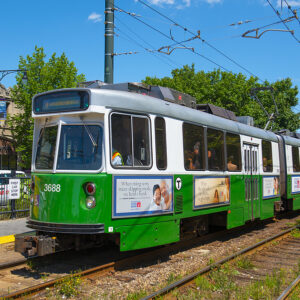This article originally appeared on the Josiah Bartlett Center website. Published with permission.
If you planned to start a new enterprise and hire someone to run it, you’d probably avoid applicants who racked up disastrous safety records and massive financial deficits on their way to being investigated and placed under remedial safety orders by the feds.
The New Hampshire Department of Transportation, though, has tapped an operator with all of those problems to run its planned Manchester-Boston commuter rail line.
Despite steep declines in commuter rail ridership, the rise of remote work and the promise of driverless cars, the state is still moving forward with plans to build a commuter rail line to Boston. (The state in 2020 approved $5.4 million in federal funds to plan the line.) Those plans name the Massachusetts Bay Transit Authority (MBTA) as the operator of the service.
Sure, the MBTA has decades of experience running commuter rail. But then, the U.S. Postal Service has decades of experience delivering mail, too.
A quick (and not comprehensive) review of the MBTA’s recent troubles should be enough to eliminate the agency as a suitable commuter rail partner for New Hampshire. A list of just some of the recent safety issues includes:
- On August 1, an MBTA train lost power for about an hour just shy of the Boston Landing station. No power = no air conditioning. Passengers were told to stay on the train, but some pried open the doors and escaped, using a ladder to climb over a fence to freedom.
- On July 28, the Federal Transportation Administration (FTA) ordered an “immediate safety standdown” at the MBTA, with required safety training for all personnel.
- On July 21, an Orange Line train caught fire while on a bridge over the Mystic River, prompting passengers to climb out of windows. One leapt into the river.
- On July 18, MBTA officials said mandated fixes to identified safety problems would cost $300 million.
- On June 23, an out-of-service Red Line train derailed in a rail yard.
- On June 13, MBTA officials defended the agency’s safety record by saying that the alarming number of derailments was lower than in previous years, with total derailments down by 50% since 2019. (Ridership collapsed in 2020 due to the pandemic, so derailments would naturally be much lower.)
- On June 8, a commuter rail train operated by a contractor for the MBTA derailed in Beverly.
- On June 1, two Green Line trains collided and derailed at the Government Center station, injuring four employees.
- On April 23, an out-of-service Red Line train derailed in Cambridge outside the Kendall/MIT station.
- On April 10, a man was dragged to his death when his arm was caught in the malfunctioning doors of a Red Line train.
- On June 15, the FTA directed the MBTA to “address ongoing safety concerns,” finding that the MBTA “faces systemic challenges in maintaining its aging infrastructure in a state of good repair and managing the ongoing operations of its complex equipment and systems.”
- On Sept. 26, 2001, an escalator malfunction injured six at the Back Bay T station.
- On July 30, 2021, a Green Line trolley crashed into another trolley near Boston University, injuring 27.
Years of poor management and questionable spending priorities have left the MBTA with inadequately trained staff, decaying infrastructure, and antiquated management systems.
The FTA’s investigation found, to cite one example, that the authority uses a paper-based record-keeping system and has not yet transitioned to storing its records digitally. This is in 2022.
The justification for building a costly commuter rail line from Boston into New Hampshire is evaporating rapidly, as we’ve documented here and here.
But even if one could build a case for some scaled-down version of commuter rail, the case for letting the MBTA run it is nonexistent.
No organization with such a dismal performance record should be given additional responsibilities, much less trusted with the lives of Granite State commuters.





